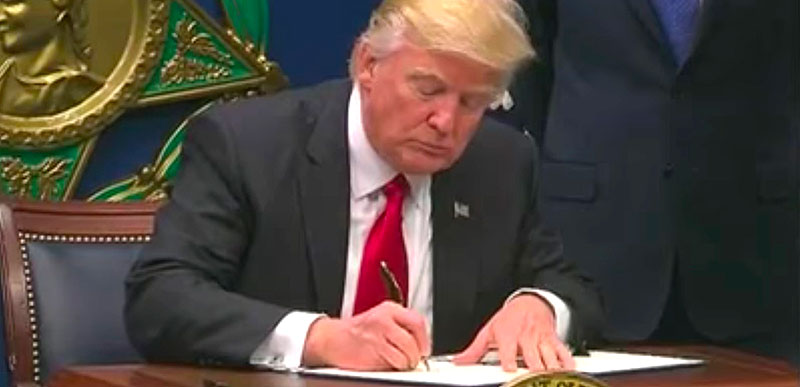So if you’re wondering what is different about the new executive order versus the old one, then this post should help with that.
First we have Napolitano on Fox Business explaining a few things about the order:
Aside from the tone of the executive order, Napolitano points out that the new order rescinds the old one, thus triggering the dismissal of all the lawsuits against the old order.
He also points out that the new order explains, by chapter and verse, exactly why they chose these six countries to put a temporary travel ban on. The old one did not do that which left the courts wondering why they were selected in the first place.
The one thing he didn’t think would bode well for the lawsuit is that, unlike the first one, it doesn’t go into effect for 10 days. He feels this hurts the credibility given that last time they argued that it must go into effect immediately as the danger is immediate.
CNN also writes about the differences in more detail below:
When does it take effect?
- 12:01 a.m. on March 16, 2017.
- Administration officials told reporters that the new executive order includes this “phase-in” period to ensure that those traveling “aren’t placed in legal jeopardy,” and in the hopes of avoiding the “chaos” seen at airports after the first executive order was signed.
Who is barred from entering the country?
- Foreign nationals who are outside the US from Sudan, Syria, Iran, Libya, Somalia and Yemen (without any valid visa) for 90 days.
- All refugees for 120 days. The previous version barred Syrian refugees indefinitely.
Who is exempt or excluded from the travel ban?
- US citizens
- Legal permanent residents (green card holders)
- Current visa holders — “any individual who had a valid visa either on January 27, 2017 (prior to 5 p.m.) or holds a valid visa on the effective date of the Executive Order is not barred from entry,” according to a fact sheet issued by the Department of Homeland Security.
- Dual nationals — “The Executive Order exempts from its scope any dual national of one of the six countries when the individual is traveling on a passport issued by a different non-designated country,” according to Homeland Security.
- In addition, the new executive order permits the issuance of a visa to, and entry of, someone who would otherwise be excluded on a case-by-case basis.
Why is Iraq off the list?
- Iraq was removed from the new executive order after intensive lobbying from the Iraqi government at the highest levels, a senior US official told CNN on Monday.
- Secretary of State Rex Tillerson also had discussions with members of the Iraqi government about the vetting measures currently in place that would prevent suspected terrorists from leaving Iraq and coming to the US.
- “Iraq is an important ally in the fight to defeat ISIS, with their brave soldiers fighting in close coordination with America’s men and women in uniform,” Tillerson told reporters.
What happened to prioritization of certain refugee claims?
- The relevant provision from the old executive order — Section 5(b) that arguably prioritized the refugee claims of certain religious minorities — is no longer part of the executive order. It was criticized for the suggestion Christian refugees would be given priority.
Are visas being revoked this time?
- Visas will not be “revoked solely based on this executive order,” according to Homeland Security.
- When the last executive was signed, the Statement Department revoked at least 60,000 visas of those coming from seven Muslim-majority countries (Iraq, Iran, Sudan, Syria, Libya, Somalia and Yemen).
What happens to all of the pending lawsuits?
- The Justice Department will likely file legal briefs in the existing cases to dissolve the current temporary restraining order halting the original travel ban. According to senior officials, the administration believes it was on “firm legal foundation,” and would prevail in the pending cases, but opted to go this route “because of the many complications that were posed.”

